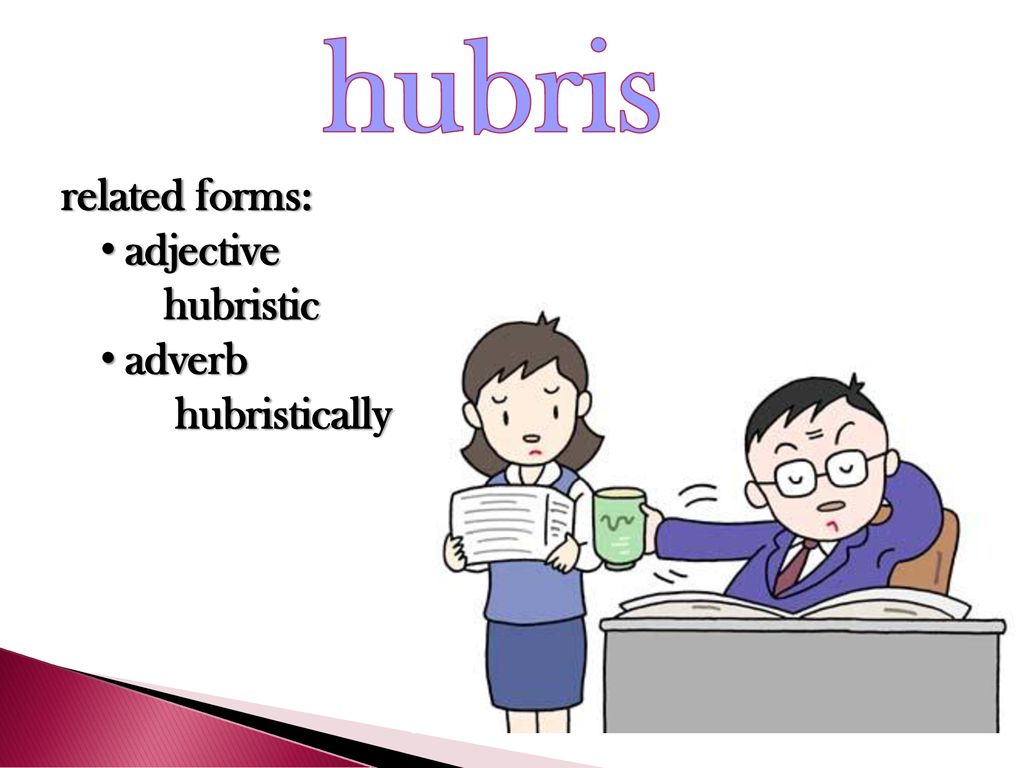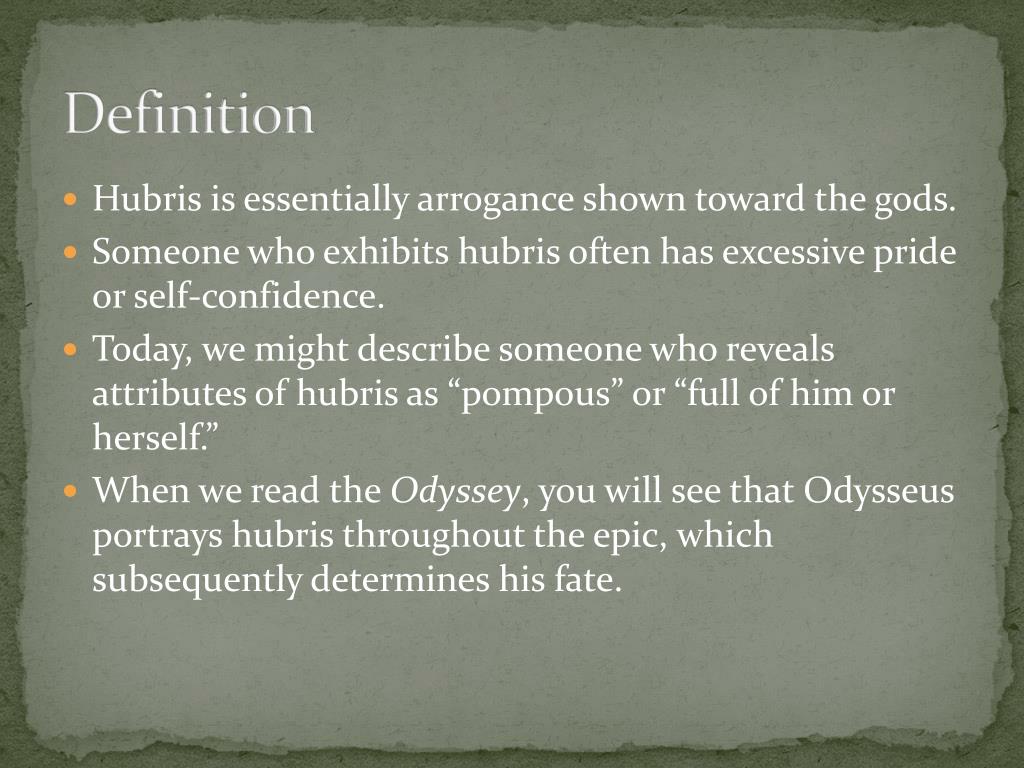Hubris Meaning - Understanding Overconfidence
Have you ever come across someone who seemed to have a bit too much confidence, a sort of puffed-up feeling that made them believe they could do no wrong? That kind of excessive self-belief, that over-the-top assurance, it's actually a concept with roots reaching back a very long time. It speaks to a particular sort of human failing, one that has been observed and talked about for centuries, and it’s something that can show up in many different situations, even today.
This idea, this way of being that seems a little too proud, has a special word to describe it. It comes from an old language, from a time when people thought a lot about what makes people succeed or, conversely, what causes them to stumble. You see, this isn't just about feeling good about yourself; it's about a kind of pride that crosses a line, a confidence that turns into something dangerous, a sense that you are beyond any challenge or criticism, as a matter of fact.
The term itself carries a lot of history, originally describing something quite serious in ancient stories and ways of thinking. Over time, its application has broadened, but its core message remains the same: a warning about the perils of too much self-importance. It’s a powerful idea, one that helps us think about human actions and their sometimes unexpected results, you know, when someone just gets a little too sure of themselves.
Table of Contents
- What is Hubris Meaning?
- Where Did the Idea of Hubris Meaning Come From?
- How Did Hubris Meaning Change Over Time?
- Hubris Meaning in Ancient Greece
- The Core of Hubris Meaning in Tragedy
- What Does Hubris Meaning Show Us Today?
- Real-Life Examples of Hubris Meaning
- Hubris Meaning and Personal Downfall
What is Hubris Meaning?
When we talk about the meaning of "hubris," we're really talking about a particular kind of human trait. It’s a sense of self-importance that goes beyond what's reasonable or healthy, a feeling of being excessively proud, almost to the point of being out of touch with reality. This isn't just about feeling good about your accomplishments; it’s about a swollen sense of your own abilities, a belief that you are somehow beyond normal limits or rules. You could say it’s a dangerous level of overconfidence, a kind of arrogance that can lead to poor choices, or perhaps even a complete disregard for others. It’s a way of talking or behaving that shows someone thinks they are far better than everyone else, a sort of puffed-up attitude that, frankly, can be a bit much. This particular quality, as a matter of fact, suggests a person is so sure of themselves that they might ignore clear warnings or sensible advice.
Where Did the Idea of Hubris Meaning Come From?
The very concept of hubris, its true meaning, has its roots in a very old place indeed. It comes to us from ancient Greece, a place where many of our ideas about human nature and storytelling first took shape. The original word, in Greek, was ὕβρις (húbris). This old Greek word had a few different shades of meaning, including 'pride,' 'insolence,' and 'outrage.' Sometimes, people also say 'hybris,' which is just another way of saying the same thing, you know, like a slightly different sound for the same concept. So, its beginnings are tied to a time when people thought deeply about human character and the consequences of certain behaviors. It wasn't just a casual term; it carried significant weight in their discussions about morality and proper conduct, or so it seems.
How Did Hubris Meaning Change Over Time?
It's interesting to consider how the meaning of "hubris" has shifted a bit through the years, yet its core idea remains. Originally, especially in ancient Athens, the word often described a very specific kind of harmful action: the intentional use of violence meant to humiliate or degrade another person. It was about shaming someone, inflicting harm not just physically, but also to their standing or dignity. Aristotle, a very smart thinker from that time, actually believed and defined hubris as precisely this: shaming the victim. He thought it was done purely for the pleasure of showing superiority, which is a rather harsh way to treat someone, you know. But as the centuries passed, the word's deeper implication changed somewhat. It came to be understood more broadly as 'overweening' pride, a kind of excessive self-regard that goes too far. The contemporary definition of hubris has certainly broadened from those very specific ancient Greek ideas. Today, it doesn't just refer to defying the gods or the natural order of things, but to a more general sense of being overly confident, a feeling that you just can't be stopped, or so it seems.
Hubris Meaning in Ancient Greece
In ancient Greece, the idea of hubris, its true meaning, was a really important part of how people understood the world and the stories they told. It wasn't just a casual term; it was a central concept in their tragedies and their ways of thinking about life. The word itself comes from the Greek word 'hybris,' which covered a range of actions or behaviors that went beyond what was considered proper or respectful. It was often seen as an affront to the gods, a human being acting as if they were equal to or even superior to the divine powers. This extreme pride, this sort of arrogance, was thought to invite punishment, a cosmic balancing act where someone who elevated themselves too much would inevitably be brought low. So, in a way, it was a warning, a moral lesson about the dangers of thinking too highly of yourself, or so they believed.
The Core of Hubris Meaning in Tragedy
When you look at Greek tragedy, the idea of hubris, its deep meaning, is often right at the heart of the story. It's typically considered a 'tragic flaw,' a significant weakness in a character's makeup that ultimately leads to their downfall. Think about those old plays: a hero, perhaps a king or a powerful warrior, might achieve great things, but then they become too proud, too sure of their own power or wisdom. This excess of ambition or pride, this sort of inflated self-view, is what sets them on a path toward ruin. It's not just a minor slip-up; it's a fundamental error in their way of thinking and acting that causes everything to unravel. The stories often show that when someone gets so confident that they start to believe they’re invincible, they are, in fact, setting themselves up for a big fall. This pattern is a really common theme in these old plays, and it’s what makes them so powerful, you know, because it reflects something very true about human nature.
What Does Hubris Meaning Show Us Today?
Even though the word "hubris" comes from ancient times, its meaning still holds a lot of weight in our modern world. It helps us think about situations where people or groups get too big for their britches, so to speak. For example, antitrust prosecutors, the people who look into whether big companies are playing fair, sometimes target those businesses that seem to exude this kind of overconfidence. It’s when a company gets so powerful and so sure of itself that it starts to act as if it's above the rules, perhaps believing it can do whatever it wants without consequence. This kind of attitude, this really strong sense of self-importance, can lead to serious problems, not just for the company, but for everyone else too. It's a reminder that even in today's complex world, the old lessons about excessive pride still ring true, or so it seems.
Real-Life Examples of Hubris Meaning
To really get a handle on the meaning of hubris, it helps to look at some everyday examples, or at least situations we can easily picture. Imagine a boxer, for instance, who is about to step into the ring with a much stronger opponent. This boxer, instead of being cautious or respectful, starts shouting, "I'm the greatest!" even though they are clearly about to get pummeled. That kind of behavior, that loud declaration of superiority right before a likely defeat, is a perfect display of hubris. It's an excess of confidence that blinds them to the reality of their situation. Another way to think about it is when someone's failure is directly brought on by their own foolish amount of pride or confidence. Their overblown sense of self-worth leads them to make mistakes they wouldn't otherwise, and then they face the consequences. This is something we see play out in various ways, in a way, in stories and in real life, again and again.
Hubris Meaning and Personal Downfall
The connection between hubris, its deep meaning, and a person's downfall is a very common thread, especially in stories and in our understanding of human events. It's an ancient Greek word that means pride or arrogance, but it's used particularly to describe that kind of excessive pride or conceit that almost always brings about someone’s ruin. Contemporary stories, whether in books or movies, often use this very idea to show how characters come to a bad end. The person gets too big for their boots, they believe they are beyond criticism or consequence, and this very belief sets the stage for their undoing. It's a recurring pattern, a sort of moral lesson that human beings have explored for a very long time: when you think you’re above everything, you’re actually setting yourself up for a significant fall. This idea of hubris, in fact, highlights how a mistaken belief in one's own absolute superiority can lead to truly unfortunate outcomes, you know, for the individual involved.
The word 'hubris' finds its origins in ancient Greece, where it was a really important concept in Greek tragedy and philosophy. It stems from the Greek word 'hybris,' which covered a range of actions or behaviors that showed extreme pride or dangerous overconfidence. This kind of excessive pride, sometimes called insolence or outrage, is a way of talking or behaving that is just too proud. In ancient Athens, hubris had a similar definition as the use of violence to shame a victim, which Aristotle believed was done to humiliate. The word’s deeper implication changed over time, and hubris came to be defined as overweening pride, an excess of confidence that suggests someone believes they’re invincible. This concept, a great or foolish amount of pride or confidence, is often seen as a tragic flaw in characters, ultimately causing their downfall. It refers not just to a defiance of the gods or the natural order, but to a general sense of being overly sure of oneself, a feeling that has been explored in dictionaries like Collins English Dictionary, Oxford Advanced Learner's Dictionary, and the OED, providing meaning, pronunciation, picture, example sentences, grammar, usage notes, and synonyms. Modern interpretations and adaptations of hubris continue to illustrate the downfall of characters in contemporary literature and films, showing how this ancient idea remains relevant today.

Hubris: Definition and Examples of Hubris in Spoken Conversation

Hubris Definition

Hubris Definition